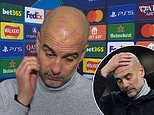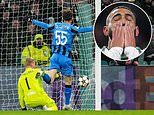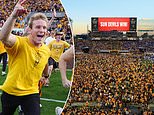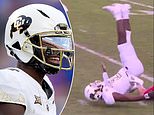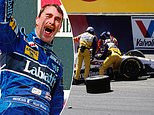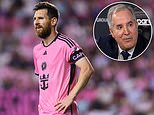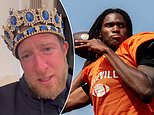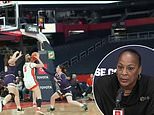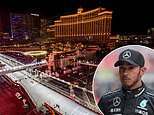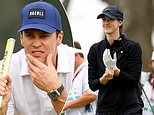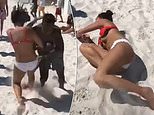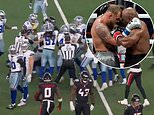On The Road in Dortmund: Before the match, the Celtic fans sang: 'This is the day when we win away...' SPOILER: This was NOT that day
The surreal and the all too real collided over three days in Dortmund. It may be best to focus first on the former as reality can bite. And it did with some ferocity in the Westfalen stadium.
But, first, the scenes before the mauling were of gaudy expectation, inventive organisation and premature celebration. There is a constant question on such a trip: how did we get here?
This is not the existential query favoured by philosophers but the game that fans indulge in when they convene in their square of choice. It is almost always amusing, occasionally educational, when supporters relate their journey to a European match.
In Thiers bar, on Market Square on Monday, a boy of about eight led the chorus of ‘This is the Day When We Win Away’. Spoiler: this was not the day. However, underneath the songs, there was a sustained murmur of where supporters had come from and where they wanted the club to go.
Michael, on his first away football trip since the death of his wife of 49 years, had driven from Dundee to Hull, caught the ferry and then driven the 180 miles to Dortmund.
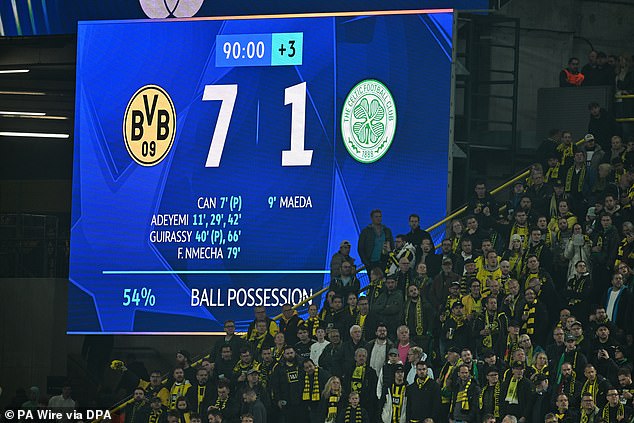
Celtic had travelled to Dortmund in fine form... but it all went very wrong on the night
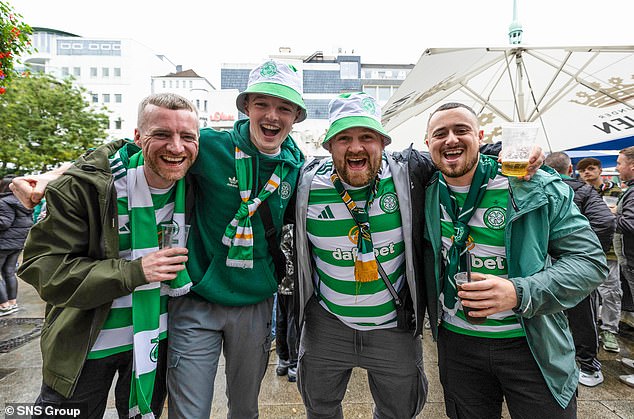
The Celtic supporters had enjoyed the build-up to game and some were cautiously optimistic
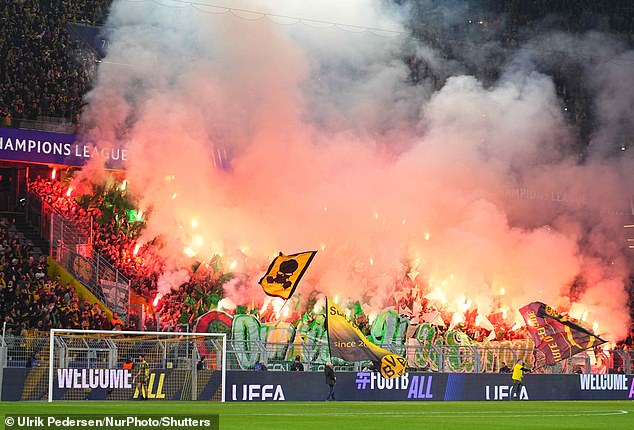
The atmosphere in Dortmund was electric, with both sets of fans putting on a show
His journey would clock in at 1,000 miles return. He was sanguine about it all. A retired businessman, he had no outlandish hopes for what might happen on the field of play.
Sitting alongside him were those who had travelled Belfast-Stansted-Dortmund, curiously one of the more straightforward itineraries.
One of my travelling companions - it was planes, trains and automobiles for us - was alerted to a ping on his phone on Tuesday afternoon. It was from a member of the Paul McStay No.1 Supporters bus from St Ninians, Stirling.
They had left home by bus on Monday night. Merely hours before kick-off, the intrepid traveller reported: ‘We are somewhere in Belgium the noo.’
The congregation in Dortmund, of course, had no intimation of the gathering storm. The surreality of fans putting cones on statues, forcing harassed bar owners to place immediate calls for reinforcements in terms of beer kegs, and benignly besieging kebab shops was generally matched by a sober reality, at least in terms of match predictions.
Many of these fans had been here before. The veterans of such trips pointed out quietly but firmly that Celtic optimism on such nights tended to evaporate on first contact with that pesky substance otherwise known as fitba’ reality.
‘I think we lose 3-1,’ said Michael. Those who proclaimed that Brendan Rodgers would lead the side to a famous victory were greeted with muted disbelief and the forbearance of those who have been marked by experience.
Pearce, an Irishman who has booked for all the away trips in this campaign, looked around the crowded, bouncing bar and noted. ‘This is how it should be. It is one of the joys of being a fan that you are allowed to believe even when part of you tells you that it is probably just daft to do so.’
The fan army had mobilised. The capitulation at the Westfalen was still some hours away.
Football shares a communal history. It can be viewed starkly on a trip around the impressive football museum in Dortmund. It is wonderfully interactive, hugely indebted to hi-tech but it also can speak to those of us who remember that a far-flung football expedition was once a trip to Gayfield from Glasgow. The football fan has become an international phenomenon in that he or she now travelling to a foreign match as something almost routine.
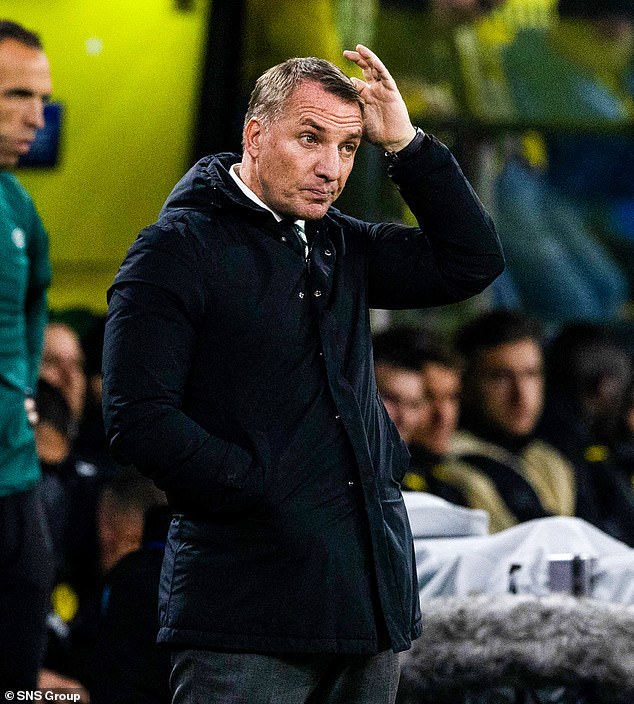
Brendan Rodgers' gameplan was exposed as Dortmund surged into a 5-1 lead at half-time
The statue of a miner in the middle of one of the museum floors is a reminder of what once sustained the game that is now a global business, gathering substantial revenues.
The statue is entitled Fifteen Minutes, a reference to the only break a Ruhr miner could expect in a working day. It brought to this mind the observation that Bill Shankly, Jock Stein and Matt Busby - a triumvirate that stands as an example of the greatest managers of the game - all had a mining background.
The exhibition also featured a fleeting reference to Schottisch tactics, a nod to the Scotch professors of the late 19th century. Celtic supporters also searched the wall in the hall of fame for the names of players for their club who had played for the national team.
There was some excitement when the names of Andreas Hinkel and Andreas Thom were spotted on the wall. There was some disbelief when one eagle-eyed fan spotted the legend: Marvin Compper (one cap in a friendly against England, since you ask).
Most conspicuously, though, it measured the distance between the game in Scotland and Germany. This is best, and brutally, measured in World Cup performances.
The introductory film charted the German success from the Miracle in Bern in 1954 to the present day. Four World Cup wins and a couple of losses in the finals places in perspective our so far unrequited dream of progressing from the group stages when we qualify.
The section on the European Cup and its maverick, money-obsessed son, the Champions League, did provide a Caledonian and Celtic cheer.
Paul Lambert’s extraordinary performance in Munich in 1997 when Dortmund defeated Juventus is marked. It was a reminder pre-match that BvB v Celtic had one levelling factor. Each club had won Europe’s premier trophy once.
‘That was obviously my greatest day as a Dortmund player,’ Lambert told me pre-match. ‘My greatest day as a Celtic player was scoring when we beat Rangers in the Ne-erday match in 1998. That was the day we believed we could stop the 10. The pressure on us was immense that season so that always holds a special place in my heart.
‘Westfalen? I had so many great moments there. I believe it is the best stadium in Europe. There are over 80,000 in there and they are right on top of you. The fans seem to pull you across the line.’
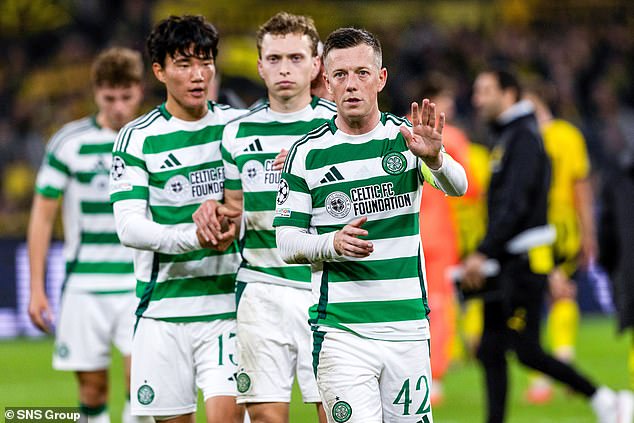
It finished 7-1 on the night and the Celtic players looked shell-shocked at the end
Dortmund did not rely on outside encouragement. The match was wrapped up with almost unseemly haste.
The home support, before the match at least, seemed more concerned with the direction of travel in the Champions League, dubbing Uefa as the ‘Mafia’ only interested in money.
It was another sign of how German fans - and those in the Westfalen, in particular - have an aversion to the commercial imperatives that now propel the game.
Michelus Gerghaut and Julius Dejtrowski - both 20-year-old students - explained what football means in this patch of Germany. ‘It is about community, it is about togetherness,’ said Gerghaut.
Both were season ticket holders at Essen, now in the 3 Liga of the Bundesliga but still attracting crowds of 18,000. ‘We are also season ticket holders here,’ said Dejtrowski. ‘But Essen have a special place as our home town club.’
Rot-Weiss Essen once were a leading team in Germany. They qualified for the first European Cup in 1955. But times change. Bayern Munich, a team who were not even included in the first Bundesliga season in 1963, now tend to rule Germany, though Bayer Leverkusen recently threatened that hegemony and Dortmund have been irritants over the years.
But the stark reality of modern football was laid bare in the Westfalen. Dortmund, last season’s Champions League finalists, sprinted away from Celtic, their victory facilitated by the almost wide-eyed innocence of the visitors’ tactical approach.
A 7-1 scoreline may seem absurd but it was far from surreal. Any dispassionate analysis pointed to the inevitability of the result given the approaches by both sides.
The BVB supporters gloried in victory. The Celtic fans remained heroically defiant. There were disgusted mutters as one listened to conversations on the road back to the city centre.
But in the Westfalen they seemed determined to sing their way out of despair. To the tune of Bella Ciao, they chorused: ‘Glasgow Celtic, the best in Scotland.’
This is true, too. But it is not enough when reality bares its teeth and bites on foreign fields.




